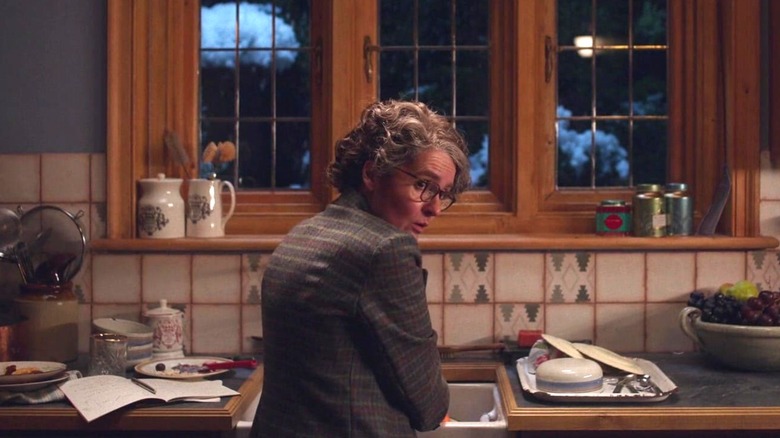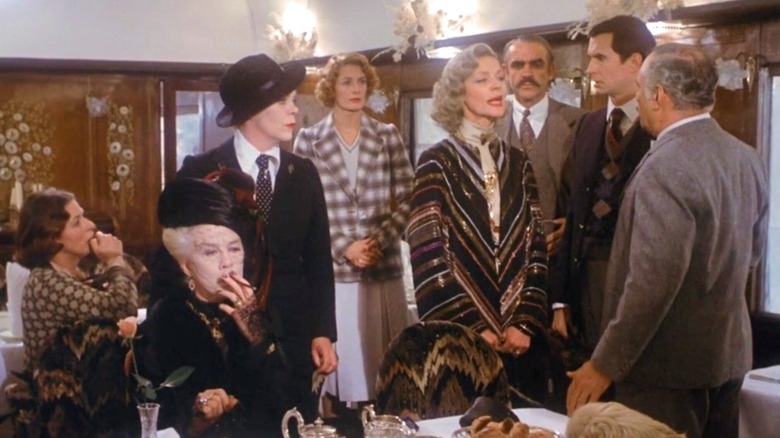What Agatha Christie Really Thought About Adaptations Of Her Work
We may receive a commission on purchases made from links.
The first film adaptation of an Agatha Christie story was Leslie H. Hiscott's and Julius Hagen's "The Passing of Mr. Quin," released in 1928. This was only eight years after her first work, "The Mysterious Affair at Styles," was published, so she was still quite active when movie versions of her stories began to appear. Starting in 1930, Christie also began penning works for the stage (starting with "Black Coffee"), so she was already a media empire unto herself, years before such a thing had become de rigueur. As of this writing, there have been about 50 official cinema adaptations of Agatha Christie's novels and short stories, close to 40 TV movies, not to mention the long-running TV shows "Agatha Christie's Poirot" (1989 — 2013) and "Agatha Christie's Miss Marple" (2004 — 2014), plus a whole host of projects where she is a character herself, including 2022's "See How They Run" (pictured above).
Delving into Christie's many radio adaptations would take too long here, and it would be foolhardy to mention all of the murder mysteries that Christie inspired. She was so prolific, and occupies such an enormous space in the murder-mystery genre, one would be forgiven for thinking she represents a majority percentage of it. All told, she wrote 74 novels and 16 plays, and published 16 collections of short stories. Christie continued to write books until 1973, and passed away in 1976 at the age of 85.
Of course, because there were so many filmed adaptations of her work, Christie had to sit through no small number of bad ones. Indeed, some of the adaptations were so utterly terrible, that her friends warned her away from seeing them. She was barred from seeing 1965's "The Alphabet Murders," saying that "my friends and publishers told me the agony would be too great."
A 2017 Radio Times piece revealed that Christie didn't have too many kind words for her movies in general.
Agatha Christie wasn't fond of many films based on her works
The Radio Times article noted that Christie really, really hated the performances of actress Margaret Rutherford, who played a whimsical, comedic version of her detective, Miss Marple, in four feature films in the 1960s. She was especially embarrassed by the 1964 film "Murder, Ahoy!", saying that she regretted selling the film rights to the Miss Marple character. "It was my fault," she was quoted as saying. "One does things for money, and one is wrong to do so, since one parts with one's literary integrity." Ouch.
Christie said elsewhere that it wasn't really Rutherford's fault, though. The author's secretary, quoted in the Smithsonian Magazine, related Christie's words when she said: "Miss Rutherford is a fine actress. She bears no resemblance to [Christie's] own idea of Miss Marple." Christie, however, wanted to prove she had no hard feelings toward Rutherford, and even dedicated her 1962 story "The Mirror Crack'd from Side to Side" to the actress.
In her autobiography, helpfully titled "An Autobiography," Christie railed against the film adaptations of her work in general, displeased with each one for one reason or another. Her most general complaint is that too many filmmakers wanted to make her murder-mysteries into whimsical comedies. For "The Alphabet Murders" — the one she was barred from seeing — the producers originally wanted comedic actor Zero Mostel to play her detective Hercule Poirot, an idea Christie rejected. The filmmakers went with Tony Randall instead, which seems like a step down to me.
Christie even disliked the widely celebrated 1974 adaptation of "Murder on the Orient Express" directed by Sidney Lumet. "It was very well made," she said, "except for one mistake I cannot find in my heart to forgive." She hated that Albert Finney, who played Poirot, fussed comedically over his weird, outsize mustache. Christie hated how "funny" it was.
She also resented that some saw her dark tales of death and murder as whimsical and cozy. They aren't. Read them, and you'll find nothing but shadows.

